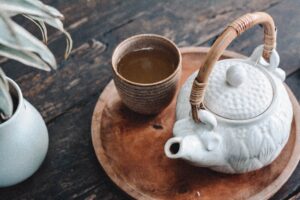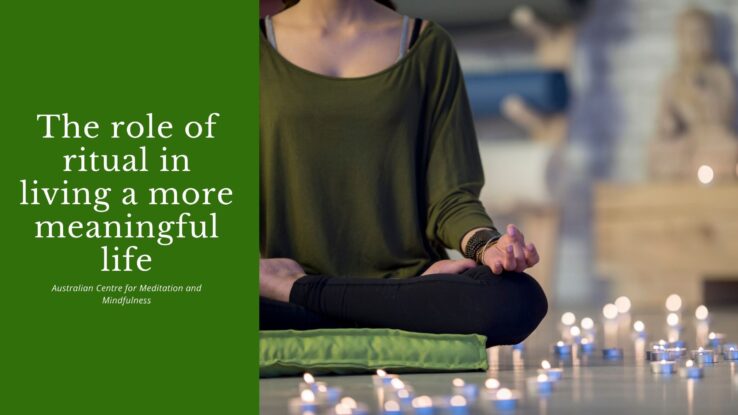The role of ritual in living a more meaningful life
This month we feature one of our electives – Spiritual Meditation. This elective is a deep dive into practical spirituality and the use of ritual to help us navigate life changes more gracefully. Spiritual Meditation is one of the elective options in our Advanced Certificate. It also forms part of the Spiritual Meditation and Women’s Meditation Specialist Streams. Read on to find out more about how pausing and honouring the depth of our experiences brings greater meaning to our spiritual life.
Becoming aware of the flow of life
I love the Sunday afternoon ritual of dumping the housework and going for a Sunday drive with my family. Today, we walked along the banks of the Yarra River in Warrandyte; a beautiful, green part of Melbourne. Interestingly, the banks of the river were bursting with the recent rain. The flow of the river was fast. As a result, not a single duck dared to enter.
How the busy pace of life stops us from feeling
As we were walking, the rumbling, speeding river reminded me of the flow of life and how crazy things can get. We can feel carried along at a furious pace, feeling powerless and unable to slow down the rush of activity. When life is flowing this fast, there is no room for the unexpected. We don’t have the time or space to pause and process emotions being stirred. Instead, we keep running with the flow, hoping we will catch up with ourselves at some point down the track. Perhaps when things slow down
Life keeps flowing, and one unfelt emotional event piles on top of another. The pile continues to grow. It becomes easier to surrender to the flow and just keep going. Speed becomes the new normal and over time we forget what it’s like to stop and feel. We may even start to feel a sense of safety in the pace that keeps us a few steps ahead of our pile of unfelt feelings. Far enough ahead that we can pretend it’s not there or perhaps forget it exists.
However, it doesn’t go away. Instead, it unconsciously drives our choices and fuels our speed. The thought of pausing and sorting the pile feels more daunting as time goes on. As we feel less, we become less connected with ourselves and others, and life becomes less meaningful. We become less present.
The role of ritual as a soothing and restorative action
In human history, rituals and rites of passage have played a vital role in our spiritual life. By pausing for ritual we create space in which we can:
- Honour the emotional traumas and joys of life,
- Release emotions and process the inevitable grief that goes with transitions; beginnings and endings,
- Find meaning, learn and recognise the gifts from relationships and life events,
- Validate the range of emotions we can feel, whether they make logical sense or not,
- Celebrate the highs,
- Acknowledge transitions and changes and react appropriately,
- Make space for complexity and confusion. In order to move through confusion, we need to spend enough time in it for meaning and understanding to evolve.
How ritual can help
In a practical sense, ritual creates a communal or private holding space in which to feel the emotions triggered by an event. It serves to bring a sense of compassion and divine honouring to what we have experienced.
The role of ritual is a symbolic act of self-love, self-acceptance and divine connection. It can help us tap into a resource that can hold and soothe pain and grief and amplify feelings of wonder and love. We can grieve or celebrate in unison and find out that we are not alone with our feelings. Ritual creates connection and connects us to our common humanity.

When we skip or by-pass the ritual of honouring
Today, in the Western world, much of this honouring through ritual has been lost. Key life events such as funerals, birth of a child and transition into parenthood have become simplified and shortened. As a result, we lose the opportunity for reinvention, self-knowledge, self-understanding, meaning and growth available in these stages.
Nurturing our spiritual life involves recognising and valuing the sacred in everything. This takes time, space and often, the support of others.
When we fail to honour the depth of our experiences, emotional energy becomes blocked and held in the body. Emotional energy seeks release, so an inner pressure and tension continues to build.
We may find ourselves:
- exploding at others,
- becoming self-critical or critical of others and angry,
- feeling depressed,
- lacking motivation and energy,
- experiencing health problems.
“Ajan Chan put it like this: If you haven’t wept deeply, you haven’t begun to meditate” Jack Kornfield
Conversely, we can be so consumed with busyness that we neglect to stop and celebrate the wonders and the good times.
Ways to honour and find a meaningful life through ritual
Some ways we can pause and honour the depth of our experience:
- Take time to grieve losses, by recalling memories or talking/writing about those people or things you have lost,
- Make time to celebrate events or achievements that have been overlooked,
- Create some self-honouring through a ritual such as an aromatherapy bath, meditation, rest or some time in nature,
- A nightly ritual of journal writing

From scared to sacred
The Spiritual Meditation Elective is available in our Advanced Certificate at ACMM. In it, we explore rituals both personal and communal. We look at their role in transforming the things we are scared of into the things that can eventually become sacred. Faith helps us make this transition. Trusting our capacity to feel allows us to honour the depth in ourselves, our challenges and triumphs.
“Whether faith is connected to a deity or not, its essence lies in trusting ourselves to discover the deepest truths on which we can rely.” Sharon Salzberg
Once we have processed and felt emotions triggered by an event, we can integrate and resolve the experience. We can glean what we need to learn, extract the gold and experience true forgiveness (if this is relevant).
Listening to ourselves
There may be some events and emotions that feel too big to manage on our own. Sometimes, we may instinctively feel ill-equipped to go there. At these times, it’s important to listen to our needs and seek professional support through a counsellor, psychotherapist or support group. We may need to build our inner resources to be able to manage the emotions attached to particular events from the past. This takes time as well. Sometimes we need to learn from the ducks and pick our timing wisely.
Above all, this elective is about practical spirituality. A blend of meditation and personal reflection that opens us up to the potential fullness of life. We are encouraged to embrace life with faith, emotional honesty and courage.
“The true task of spiritual life is not found in faraway places or unusual states of consciousness: It is here in the present.
It asks of us a welcoming spirit to greet all that life presents to us with a wise, respectful and kindly heart.
We can bow to both beauty and suffering, to our entanglements and confusion, to our fears and the injustices of the world.
Honouring the truth in this way is the path to freedom”. Jack Kornfield




